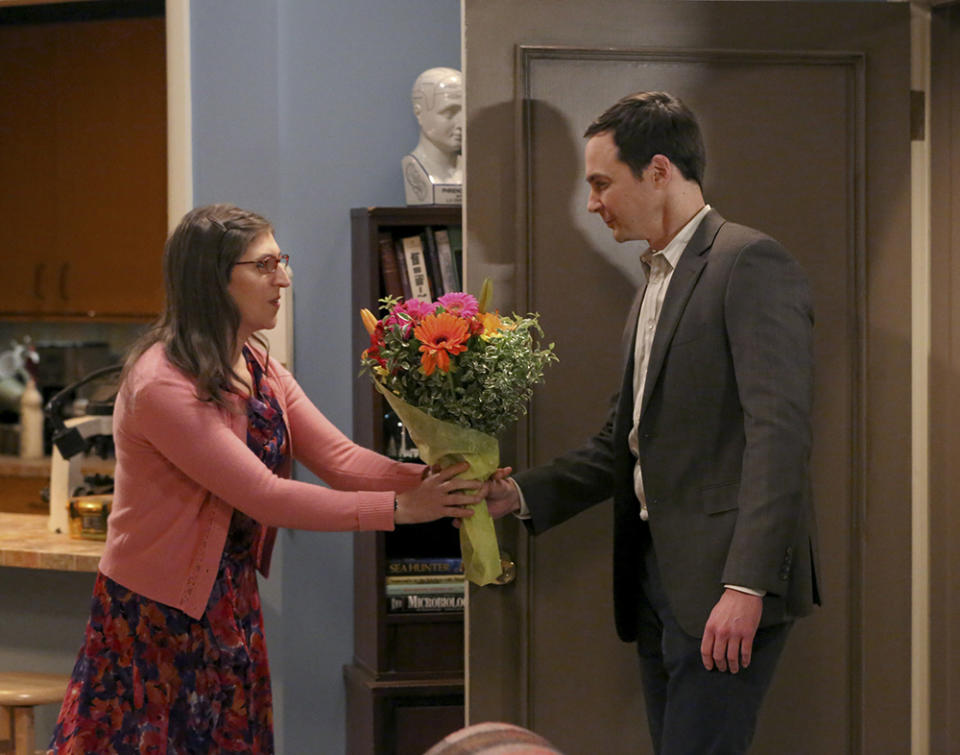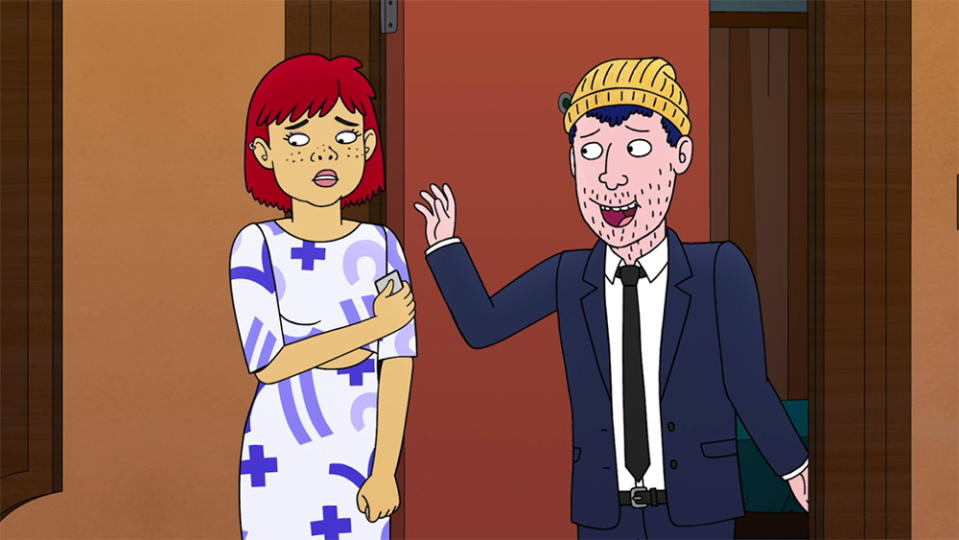How Television Is Leading the Asexual Revolution

For an animated series about anthropomorphic animals and the people who love them, BoJack Horseman doesn't shy away from surprisingly dark and serious social issues. Its first season focuses on the titular character's substance abuse and depression. Its second takes on sexual harassment in Hollywood. Season Three, which premiered on Netflix in July, tackles abortion, safe spaces for women, and sexuality.
In the final episode of the season, titled "That Went Well," BoJack's sidekick and perennial couchsurfer Todd eats ice cream at a local diner with Emily (voiced by Broad City's Abby Jacobson), his ex-girlfriend from high school with whom he's recently reconnected. They fantasize about what they'd do if they had millions of dollars. But the conversation quickly changes in tone once Emily ask if he's gay.
"I'm not gay," he replies. "I mean, I don't think I am, but I don't think I'm straight, either. I don't know what I am. I think I might be nothing."

Todd's response can be read as asexual. As Asexuality.org explains, "An asexual person is a person who does not experience sexual attraction." It's an umbrella term that applies to a general group: people in stable relationships, people with sexual urges they don't act on, people with attractions beyond sexual ones, and people that have sex.
[contentlinks align="center" textonly="false" numbered="false" headline="More 'BoJack Horseman'" customtitles="'BoJack Horseman' Is Both Hilarious and Sad|Making the Nearly Silent BoJack Horseman Episode |How BoJack Horseman Got its Original Music" customimages="||" content="article.46874|article.47069|article.47678"]
"Asexual" might be gaining more common usuage these days, but that might not necessarily be Todd's identity. We can also read Todd as aromantic, as an aromantic person experiences little, if at all, romantic attraction to others. The LGBT Center at UNC-Chapel Hill differentiates sexual orientation from romantic ones. People that identify as straight often are heteroromantic (sexually and romantically attracted to the opposite gender), while people that identify as gay are often homoromantic (they're both sexually and romantically attracted to the same gender). People that identify as asexual, however, are often aromantic-they're neither sexually nor romantically attracted to anyone. Not everyone in these identities follow this expectation, though.
What makes this particular scene unique is Emily's response. "Oh, well, that's okay," she replies. She doesn't ask questions.
People that identify as asexual are often aromantic-they're neither sexually nor romantically attracted to anyone.
Aaron Paul, the actor who voices Todd, was quick to identify his character's sexuality, telling the New York Times that Todd is "the first asexual character in television." But Paul might be jumping the gun there, as Todd isn't the first asexual character ever in television.
Sheldon Cooper from The Big Bang Theory immediately comes to mind. Although creator Bill Prady didn't intentionally write him as asexual character, Sheldon is commonly read as such. For years, Sheldon's relationship with his partner, Amy, relied on an emotional bond rather than sex. Writer Trilby Beresford argues in an essay for The Week that everything changed when the couple had sex, writing, "The show will be remembered for re-writing said character as a guy's guy whose future will probably include marriage, and all that boring 'adult' stuff that screams normality."

For Bitch Magazine, aromantic asexual activist Lauren Jankowski (who runs a blog called Asexual Artists, where she interviews asexual creatives-writers and filmmakers included-about their work) discusses the problem with asexual characters in popular culture. While it's great to see more asexual representation in media, she stresses how asexuality is "portrayed as a problem that's fixable." Meanwhile, in Flux Weekly, writer Emmi Kern explains the connection between sex and drama, which makes sexual characters inaccessible to the asexual community. Without sexuality, many stories lose their plot. While The Big Bang Theory may touch upon asexuality, Kern doesn't feel Sheldon is the best representative for their community.
It's also worth noting that although Sheldon and Amy had sex, his identity doesn't suddenly change. Just like sexuality, asexuality is also a spectrum.
Just like sexuality, asexuality is also a spectrum.
The third season's second episode, "The BoJack Horseman Show," set in 2007, introduces the high-school-era Emily and Todd, with the former focused on who her obvious crush "likes." Todd says, "I don't like anyone," to which Emily replies, "You have to like someone." Later, the two end up in a closet at a party for that adolescent rite of passage, Seven Minutes in Heaven. Todd has never kissed someone, but Emily asks if he would like to try. "How should we do it?" he asks. "French style, Eskimo, butterfly?" The scene ends with the two locking lips.
In the fifth episode, "Love And/Or Marriage," Emily asks about Todd's girlfriend. "This is so embarrassing for you, but I actually don't have a girlfriend," he replies in his typically oblivious way. "That's a really weird assumption for you to make." Relieved, Emily mentions how she happens to be single as well. BoJack then interrupts to hand over a key to their unoccupied hotel room and suggests the two "should just go see if the bed works." Todd walks away to grab another drink.

Later that night, Emily accompanies Todd to the hotel room. Seconds after opening the door, she grabs his hand and explains she wants to fool around, gesturing him inside. Instead, he emphasizes how much he drank earlier and insists on going to bed. "It was great seeing you," he says as he abruptly shuts the door.
Jankowski expresses concern when I ask for her perspective on Todd and Emily's early interactions on BoJack Horseman. "When there's a suggestion of dehumanizing asexuality-'Let's test it out, what will make them uncomfortable?'-it seems like that kind of behavior is seen as okay to do," Jankowski explains. "It also suggests to younger aces that you will never be accepted, [because] somebody's going to be questioning your identity and trying to 'fix you.'"
When there's a suggestion of dehumanizing asexuality, it also suggests that you will never be accepted, because somebody's going to be questioning your identity and trying to 'fix you.'
Jankowski also stressed that asexual representation begins in the writer's room. Representation is step one, but accuracy is the second. "You're not seeing a lot of openly asexual creators writing these characters, and that concerns me," she says. "I would like to see a normalization that platonic relationships are just important as romantic ones."
It's great to see an asexual character in a mainstream television show. It's even better for characters' reactions, like Emily's, to be so positive and accepting-that's already revolutionary. Asexual representation on film and television, however, still needs progress. BoJack Horseman will return for Season Four, which may reveal how far Todd's asexuality will be portrayed, tested (if at all), and how well (or not) the rest of the show's characters will react.
guys. season 4... it's happening! #ibingedtoohardlastnight #thankyoutomyfans #hopeyouarelovingseason3 pic.twitter.com/lZwuqRkpj0
- BoJack Horseman (@BoJackHorseman) July 22, 2016
You Might Also Like

